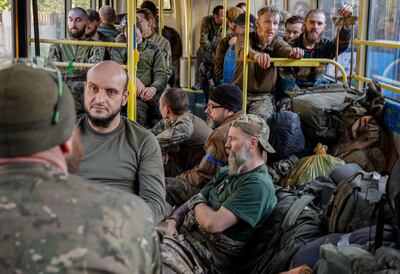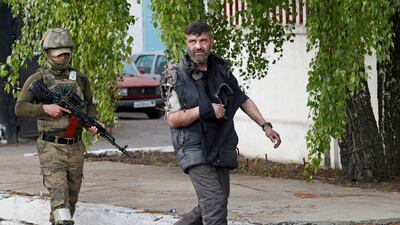Live updates: follow the latest news on Russia-Ukraine
About 1,000 Ukrainian fighters, including 80 wounded, surrendered this week from the bunkers and tunnels below the Azovstal steelworks in the besieged city of Mariupol, Russian authorities have said.
Concerns grew on Wednesday for the welfare of the fighters, many of them members of the Azov Battalion, who gave themselves up after weeks of resistance.
The surrender brought an end to the most devastating siege of the war in Ukraine and allowed Russian President Vladimir Putin to claim a rare victory in his faltering campaign, which military analysts say has stalled.
A video released by the Russian Defence Ministry showed fighters leaving the plant. Some were carried on stretchers and others put their hands up to be searched by Russian troops.
Many of the fighters boarded buses and were escorted by Russian armoured vehicles to the south-eastern Russian-held town of Novoazovsk, where Moscow said wounded fighters would be treated.

The soldiers will be questioned by a Russian committee investigating what Moscow has called "Ukrainian regime crimes", the Tass news agency reported.
"Over the past 24 hours, 694 militants surrendered, including 29 wounded," the ministry said. "In total, since May 16, 959 militants surrendered, including 80 wounded."
Ukraine is working to move more of its fighters out of the compound, President Volodymyr Zelenskyy said.
The "evacuation mission continues”, overseen by the military and intelligence services with help from “the most influential international mediators", Mr Zelenskyy said in a nightly video address to the nation.
He said he also discussed the situation with French President Emmanuel Macron.
Mr Zelenskyy has said there can be no talks with Moscow if the Azovstal fighters are killed.
While Ukraine and Russia have spoken of a deal under which all Ukrainian troops would abandon the steelworks, many details were not made public, including how many fighters remained inside and whether any form of prisoner swap was agreed to.
Moscow said Mr Putin personally guaranteed the prisoners would be treated according to international standards. Ukrainian officials said they could be part of a prisoner exchange involving Russian prisoners.

But Russia's deputy ambassador to the UN, Dmitry Polyanskiy, said no deal had been agreed.
"I didn’t know English has so many ways to express a single message: the Azovnazis have unconditionally surrendered," he said on Twitter.
High-profile Russian lawmakers spoke out against any prisoner swap. Vyacheslav Volodin, chairman of the State Duma, Russia's lower house, said: "Nazi criminals should not be exchanged."
Leonid Slutsky, one of Russia's negotiators in talks with Ukraine, called the fighters "animals in human form" and called for them to be executed.
Formed in 2014 as an extreme right-wing volunteer militia to fight against Russian-backed separatists, the Azov Battalion denies being fascist or neo-Nazi. Ukraine says it has been reformed and integrated into the National Guard.
Mariupol was a target for Russian forces early in the invasion.
The UK Ministry of Defence said in its daily intelligence report on Wednesday that Ukraine fought hard to hold a city as Russia sought a land corridor from its home territory to the Crimean Peninsula, which it seized from Ukraine in 2014.
“Despite Russian forces having encircled Mariupol for over 10 weeks, staunch Ukrainian resistance delayed Russia’s ability to gain full control of the city,” the ministry said.
“This frustrated its early attempts to capture a key city and inflicted costly personnel losses among Russian forces.”
The end of the battle for Mariupol is Russia's biggest victory since it launched what it calls a "special military operation" in Ukraine on February 24.
It gives Moscow control of the Azov Sea coast and an unbroken stretch of eastern and southern Ukraine. But the port lies in ruins and Ukraine believes tens of thousands of people were killed in months of Russian bombardment.
Russia's offensive in the east, meanwhile, appears to be making little progress, although Moscow says all of its objectives will be reached.
About a third of the Donbas region was held by Russia-backed separatists before the invasion.
Moscow now controls about 90 per cent of Luhansk region, but it has failed to make major inroads towards the key cities of Sloviansk and Kramatorsk in Donetsk to expand its control over the entire Donbas.


